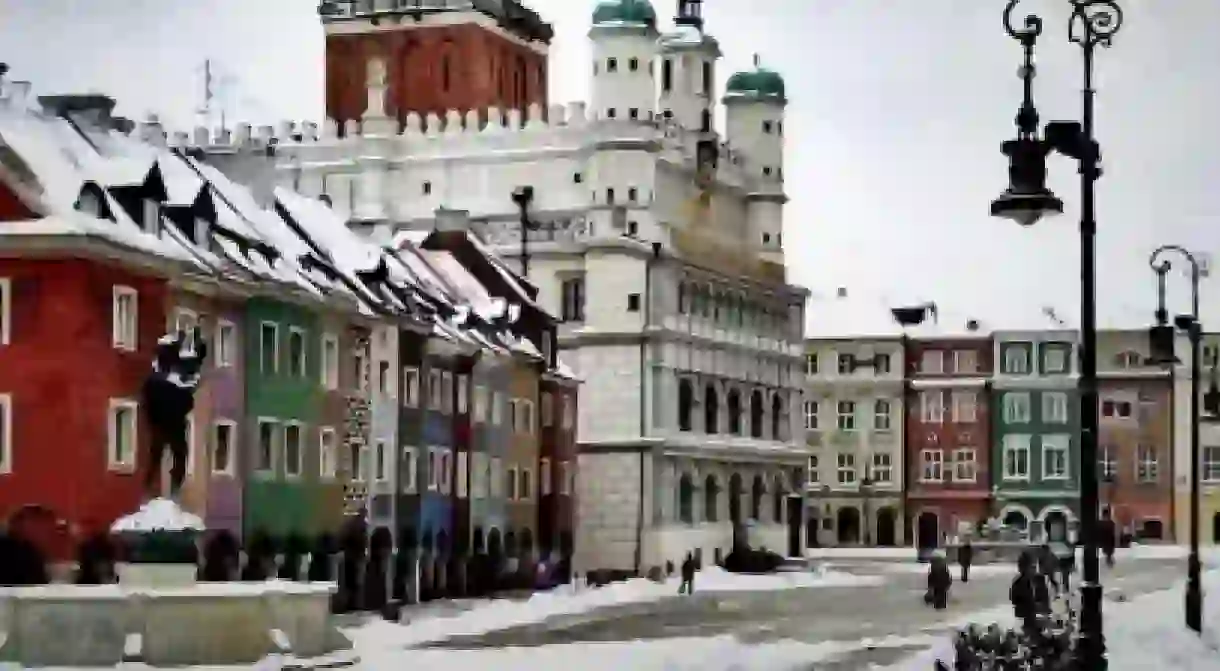The 10 Best Restaurants In Poznań, Poland

Poznań, the capital of the Wielkopolska (Greater Poland) region and home to half a million people, has always played an important role in Poland’s history and today is one of the most vibrant Polish cities. Here are ten of Poznań’s restaurants worth going to, ranging from traditional and located in the old town, to modern, international and design-oriented venues.

Bazar 1838
Restaurant, Polish, European

The re-opening of the Bazar 1838 restaurant marked a return to the historic, legendary Bazar that existed between 1838 and 1939 and was one of the best hotels and diners in Poznań. The new chef Jacek Fedde has his own, elegant way of interpreting the traditional Polish recipes. His speciality is baked duck with dumplings in Madeira sauce. The restaurant also offers its own mature hams prepared in-store.
Concordia Taste
Restaurant
Concordia Taste is as much a restaurant as a design showcase space, created in order to appreciate Polish design and post-industrial aesthetics. The most important and unique feature of the restaurant is the mobile culinary Food-Lab station. It is a combination of a culinary workshop space and a modern kitchen, where the cooks work in front of the guests. The menu is not regional but represents a tasty mix of everything the large number of chefs come up with or whatever the clients wish to eat.
Ratuszova
Restaurant, Polish

This restaurant is located in a Renaissance tenement house in the historical heart of the city. The decorations of the interiors reference the traditional Polish design and history, and so does the menu. The chef’s recommendations are prime sirloin tartare with cucumber, onion and capers or duck baked with apples, served with yeast buns and red cabbage, baked apple and cranberry conserve. The menu is rich with poultry, veal, beef, and fish dishes, as well as the Polish dumplings pierogi.
Dark Restaurant
Restaurant, Polish, European
The Dark Restaurant is a one big social and sensory experiment. You converse and eat in darkness, allowing your other senses, taste, hearing, smell, to be heightened. Without any presumptions coming from the look of your meal, you allow only your taste buds to judge the dish. The waiters help you with your choices and guide you through the experience. This restaurant offers four sets of courses which you can choose from.
Zagroda Bamberska
Hotel Restaurant, Polish, European

This restaurant is located in a charming, historic building, where Bambrzyused to live, a Polish minority descended from the Germans of the city of Bamber. Referencing this group’s self-reliance, the Zagroda Bamberska makes and prepares its own bread, hams, cakes, and even grows its herbs in the nearby garden. The restaurant’s menu displays a number of local dishes, the most typical of which are roasted cheese with the Bamber bread, the żurek soup, or a wild boar chop. The charming, wooden house that is home to the restaurant is surrounded by gardens.
Kyokai Sushi Bar
Restaurant, Sushi

Kyokai Sushi Bar is the best Japanese restaurant in Poznań. It draws on the Japanese culinary tradition when it comes to both the recipes and the aesthetics behind the food presentation. Kyokai’s interiors are modern and elegant, and its aim is to create a family-like atmosphere, characteristic of the Japanese dining experience. The menu offers various types of sushi including hosamaki, nigiri, futomaki, kizu, gunkanmaki, and many more. Additionally, you can order a salad with avocado and seafood and sake ikura,caviar with salmon and partridge yolk.
NIFTY No.20
Restaurant, European
This contemporary and fresh restaurant and café is located at the PURO Hotel. Believing in the idea that food is at the heart of cross-cultural communication, the colorful and casual diner offers a variety of plates from different places and eras. The menu of NIFTY No.20 includes grilled tuna steak served with Provençal vegetables and roasted potatoes, beef burger with homemade chips and yogurt sauce, and pasta with beans, tomatoes and young cabbage. Poznań | © Krzysztof Szarzyński/Flickr
Toga
Restaurant, Polish, European

The Toga restaurant, situated near the National Museum and the Independence Square, draws on the Polish noble and middle-class tradition alike. The restaurant’s main courses menu changes with the seasons. It also offers breakfast food, such as oven-baked Camembert cheese with bay bolete mushrooms and white wine, various appetizers, soups, such as the spinach soup with smoked salmon, and seafood as well as salads. The restaurant’s interiors are very elegant but at the same time cozy and friendly.
Hugo Restaurant
Restaurant

This restaurant, whose motto is ‘Respect for food’, belongs to the Slow Food movement. It offers the modern European cuisine, unique in Poznań. Its interiors are modern and simple, designed in an elegant and artistic way. The menu includes scallops tartar served with corn salad, apples and baked blood sausage, or baked salmon with celery, green lentils and served with calamari sauce.
Cucina 88
Restaurant, Polish
Cucina 88 focuses on the delicious Italian cuisine and treats cooking the way Italians do. The specialty of this restaurant is oven-baked pizza, prepared in a real wooden oven, on thin crust that is used in Naples, the motherland of pizza. Cucina’s chef, Ernest Jagodziński, has won culinary awards and participated in international cooking programs. Apart from the pizza, the menu includes meat and fish dishes, pastas, soups, and desserts. The restaurant also offers authentic Italian pastries and coffee.













